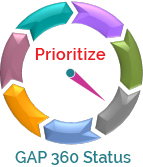
ABOUT public forum at FORCE Conference
Genetics is a rapidly advancing area of science and medicine. Genetic testing has become more complicated with the discovery of new genes that affect cancer risk. Guidelines recommend that people speak with trained experts known as genetic counselors before undergoing genetic testing. As the cost of genetic testing has decreased, more people are turning to health care providers without expertise in genetics for information about genetic testing and medical options for managing risk. There is a lack of research on the quality of the information and the amount of misinformation that health care providers are sharing with patients with regards to cancer genetic testing, and the best ways to assure that health care providers are following recommended national guidelines.
Our Steering Committee and Research Work Group gave this study a prioritization score
of 3.52 out of 4 points, meaning this is a high-priority study.
Our Executive Committee and research team considered the feasibility of this
study through ABOUT as No->Low.
Our Steering Committee prioritizes questions based on four parameters on a scale from 1-4. Here are the average scores:
Our Executive Committee scored feasibility as low based on the following considerations:
Cragun D, Scherr C, Camperlengo L, Vadaparampil ST, Pal T. Evolution of Hereditary Breast Cancer Genetic Services: Are Changes Reflected in the Knowledge and Clinical Practices of Florida Providers? Genet Test Mol Biomarkers. 2016 Aug 15. [Epub ahead of print]
Cohn J, Blazey W, Tegay D, Harper B, Koehler S, Laurent B, Chan V, Jung M, Krishnamachari B. Physician Risk Assessment Knowledge Regarding BRCA Genetics Testing. Journal of Cancer Education. September 2015, Volume 30, Issue 3, pp 573–579.
Updated 09/11/16
Cancer survivors
Previvors/High risk people
Men
Women
People with a BRCA mutation
People with an ATM, PALB2, PTEN, or other mutation that increases cancer risk
People with Lynch Syndrome
People at high risk for breast cancer
People at high risk for ovarian cancer
People who are newly diagnosed with cancer

ABOUT is a Patient-Powered Research Network in PCORnet®, the National Patient-Centered Clinical Research Network, an initiative funded by the Patient-Centered Outcomes Research Institute (PCORI).


© FORCE: Facing Our Risk of Cancer Empowered Inc. info@facingourrisk.org
Website by Rareheron Web Design